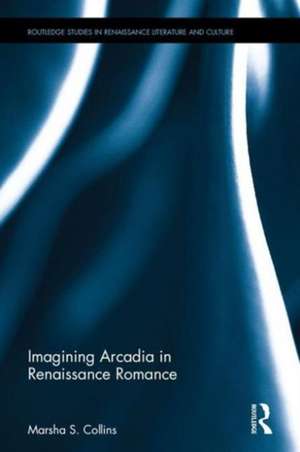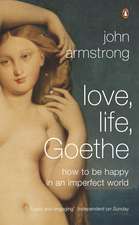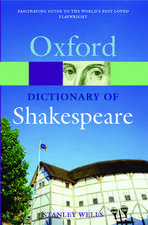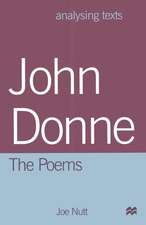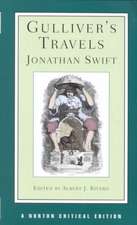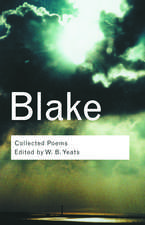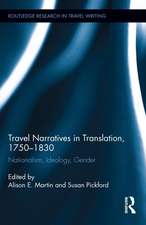Imagining Arcadia in Renaissance Romance: Routledge Studies in Renaissance Literature and Culture
Autor Marsha S. Collinsen Limba Engleză Hardback – 6 apr 2016
This book addresses the under-representation of Spanish literature in Early Modern literary histories, especially regarding the rich Spanish contribution to the pastoral and to idealizing fiction in the West. Companion chapters on Cervantes and Sidney add to the growing field of Anglo-Spanish comparative literary studies, while the book’s comparative and transnational approach extends discussion of the pastoral beyond the boundaries of national literary traditions. This book’s innovative approach to these fictional worlds sheds new light on Arcadia’s enduring presence in the collective imagination today.
| Toate formatele și edițiile | Preț | Express |
|---|---|---|
| Paperback (1) | 272.06 lei 6-8 săpt. | |
| Taylor & Francis – 21 mai 2019 | 272.06 lei 6-8 săpt. | |
| Hardback (1) | 1057.13 lei 6-8 săpt. | |
| Taylor & Francis – 6 apr 2016 | 1057.13 lei 6-8 săpt. |
Din seria Routledge Studies in Renaissance Literature and Culture
-
 Preț: 326.26 lei
Preț: 326.26 lei -
 Preț: 714.58 lei
Preț: 714.58 lei -
 Preț: 310.09 lei
Preț: 310.09 lei -
 Preț: 485.40 lei
Preț: 485.40 lei -
 Preț: 339.89 lei
Preț: 339.89 lei -
 Preț: 446.95 lei
Preț: 446.95 lei - 18%
 Preț: 1053.95 lei
Preț: 1053.95 lei -
 Preț: 443.65 lei
Preț: 443.65 lei - 18%
 Preț: 1001.90 lei
Preț: 1001.90 lei - 18%
 Preț: 1110.77 lei
Preț: 1110.77 lei -
 Preț: 278.46 lei
Preț: 278.46 lei - 18%
 Preț: 1109.21 lei
Preț: 1109.21 lei - 18%
 Preț: 1053.16 lei
Preț: 1053.16 lei -
 Preț: 389.38 lei
Preț: 389.38 lei - 31%
 Preț: 763.81 lei
Preț: 763.81 lei -
 Preț: 440.97 lei
Preț: 440.97 lei - 26%
 Preț: 764.62 lei
Preț: 764.62 lei - 13%
 Preț: 321.08 lei
Preț: 321.08 lei - 26%
 Preț: 765.01 lei
Preț: 765.01 lei -
 Preț: 433.26 lei
Preț: 433.26 lei - 18%
 Preț: 1062.26 lei
Preț: 1062.26 lei - 18%
 Preț: 1111.40 lei
Preț: 1111.40 lei - 18%
 Preț: 1105.24 lei
Preț: 1105.24 lei - 18%
 Preț: 1061.22 lei
Preț: 1061.22 lei - 18%
 Preț: 1138.65 lei
Preț: 1138.65 lei -
 Preț: 387.49 lei
Preț: 387.49 lei - 18%
 Preț: 1053.92 lei
Preț: 1053.92 lei -
 Preț: 487.19 lei
Preț: 487.19 lei - 26%
 Preț: 762.57 lei
Preț: 762.57 lei -
 Preț: 416.22 lei
Preț: 416.22 lei - 18%
 Preț: 1111.55 lei
Preț: 1111.55 lei - 18%
 Preț: 1040.35 lei
Preț: 1040.35 lei - 18%
 Preț: 1000.27 lei
Preț: 1000.27 lei - 30%
 Preț: 847.73 lei
Preț: 847.73 lei - 30%
 Preț: 851.75 lei
Preț: 851.75 lei - 18%
 Preț: 1055.51 lei
Preț: 1055.51 lei - 18%
 Preț: 1050.09 lei
Preț: 1050.09 lei - 26%
 Preț: 765.77 lei
Preț: 765.77 lei
Preț: 1057.13 lei
Preț vechi: 1289.18 lei
-18% Nou
Puncte Express: 1586
Preț estimativ în valută:
202.31€ • 210.43$ • 167.02£
202.31€ • 210.43$ • 167.02£
Carte tipărită la comandă
Livrare economică 14-28 aprilie
Preluare comenzi: 021 569.72.76
Specificații
ISBN-13: 9781138900684
ISBN-10: 1138900680
Pagini: 286
Ilustrații: 2
Dimensiuni: 152 x 229 x 20 mm
Greutate: 0.52 kg
Ediția:1
Editura: Taylor & Francis
Colecția Routledge
Seria Routledge Studies in Renaissance Literature and Culture
Locul publicării:Oxford, United Kingdom
ISBN-10: 1138900680
Pagini: 286
Ilustrații: 2
Dimensiuni: 152 x 229 x 20 mm
Greutate: 0.52 kg
Ediția:1
Editura: Taylor & Francis
Colecția Routledge
Seria Routledge Studies in Renaissance Literature and Culture
Locul publicării:Oxford, United Kingdom
Public țintă
Postgraduate and UndergraduateCuprins
1. Weaving the Arcadian Tapestry 2. In the Ending is the Beginning: Sannazaro’s Arcadia (1504) 3. The Metamorphosis of Arcadia: Montemayor’s La Diana (1559) 4. Romancing Arcadia: Cervantes’ La Galatea (1585) 5. Romancing Arcadia: Sidney’s Arcadia (1590) 6. Courting Arcadia: Lope’s Arcadia (1598) Conclusion
Recenzii
"Marsha Collins’s approach to the construction, or reconstruction, of Arcadia in the sixteenth century is fascinating and convincing. Her study presents a dynamic vision of the pastoral world and its special sensibility. The comparative analyses—of Sannazaro, Montemayor, Cervantes, Sidney, and Lope de Vega—are sound, well argued, and a pleasure to read, offering a superb complement to previous studies of the genre." – Edward H. Friedman, Professor of Comparative Literature and European Studies. Vanderbilt University, USA
Descriere
This book analyzes the role of romance as a catalyst in remaking Arcadia in five, canonical sixteenth-century texts: Sannazaro’s Arcadia; Montemayor’s La Diana; Cervantes’ La Galatea; Sidney’s Arcadia; and Lope de Vega’s Arcadia. Collins’ analyses of the re-imagined Arcadia in these works elucidate the interplay between timely incursions into the fictional world and the timelessness of art, highlighting issues of freedom, identity formation, subjectivity and self-fashioning, the intersection of public and private activity, and the fascination with mortality.
